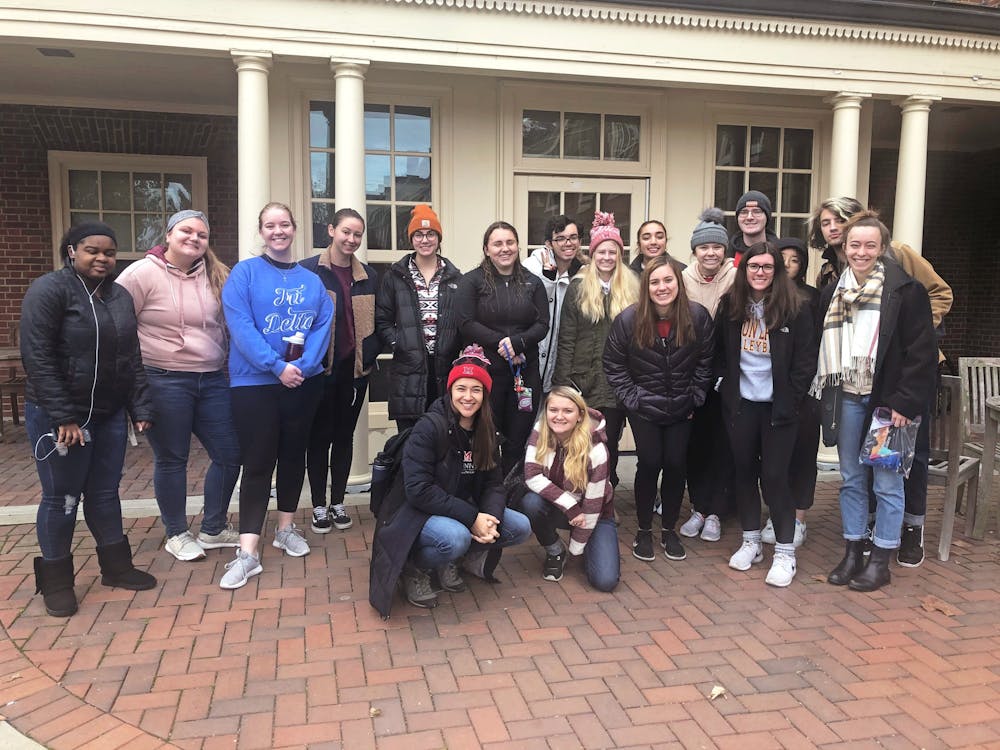The climate strike held on Miami’s campus last semester left some participants partially unsatisfied. At the strike’s close, student leaders like Cassie Conrad and Allison South felt that something needed to change.
The event, populated by students from environmentally-centered groups and those who were simply passionate about the environment, saw protesters surround Miami's Marcum Conference Center. Some marched uniformly, wielding colorful signs displaying slogans like, “Act now or swim later” and, “Don’t be a fossil fool.” Others were less restrained. Some shouted and banged on the walls of the Marcum Center, where University President Greg Crawford was holding a Board of Trustees meeting.
"There were so many groups doing so many things," said Conrad, president of the Miami eco-group Zero Waste Oxford (ZWO). "A lot of them didn't represent what we were actually trying to accomplish."
Conrad said the event felt like a perfect representation of how Miami's eco-groups interact on campus.
There are over a dozen groups with an environmental focus at the university, and until recently, they had little in the way of contact or communication with one another. With so many organizations overlapping one another, effort was wasted and potential members for each club slipped through the cracks. Members of the groups were left wondering if there was a better way to coordinate their efforts.
Although Miami’s many eco-groups work toward a similar goal of making Miami more environmentally-friendly, they each have their own way of going about actualizing those goals.
ZWO focuses primarily on hosting workshops that educate students about how to eliminate waste from their lives, as well as putting on a “Pop-Up Thrift Shop” in Armstrong three times a semester. The group sets up their store in room 1072 in Armstrong, turning the blank study space into a sea of retro reds, glamorous greens and brilliant blues.
“The thrift shop is our most well-known event,” Conrad said. “It’s also my favorite because it gets our message out in a way that students can easily understand and connect with.”
Where ZWO works toward changing Miamians’ attitudes toward waste, Miami’s Eco-Reps targets dorms specifically.
South, Eco-Reps’ president, said she’s glad the group has an area on campus they’re dedicated to, unlike some other eco-groups.
“Focusing on [the dorms] allows us to work in a really cohesive manner,” South said. “We’ve got our system down pat, and we’re able to move towards specific goals in a way that I’m not sure every other org on campus is.”
Some of Eco-Reps’ most consistently-successful efforts are their weekly trash audits. Members of the Eco-Reps team sift through the dorm’s collective trash cans, separating the recyclables from the non-recyclables. Auditors hope to demonstrate to the dorm’s inhabitants just how accidentally wasteful they can be.
Enjoy what you're reading?
Signup for our newsletter
Through events like the trash audits and the pop-up thrift shop, each eco-group on campus has established their own way to help save the planet.
But until recently, they didn’t have a good way to coordinate and focus their efforts.
Adam Sizemore, director of Miami's Sustainability Department, said when coming into his position in 2018, he could tell the groups on campus were anxious for that to change.
“Talking to members of each group, you could tell they all wanted to be doing more and doing more together,” Sizemore said. “So we went through a few brainstorming sessions and finally came to a pretty satisfactory conclusion.”
As the 2019-2020 school year dawned, the situation for eco-groups on campus changed. At the start of the year, the university reached out to each of the environmentally-focused efforts to create the Student Sustainability Council. At monthly meetings, the presidents of each organization meet with one another and with Sizemore to voice their concerns and discuss where to go from here.
Aside from ZWO and Eco-Reps, the council is made up of Engineers Without Borders, Green Team, Green Oxford, the EAP LLC, Green Hawks Media and Leaders of Environmental Awareness and Protection (LEAP). In addition, Antonio Lim, Associated Student Government's Secretary of the Infrastructure and Sustainability Committee, is the president of this council.
"It gives us the chance to present ourselves as a united front," Conrad said. "We can join together and really let the university know we're here and we care."
Through this council, student organizations now have clearer lines of communication, both with one another and with the university. Although South still has her reservations about Miami’s sincerity towards sustainability efforts, she’s optimistic about the existence of the council.
“[The council] might not give us a ton of influence over how Miami thinks, but it at least gives us a platform to voice our concerns and coordinate how we want to go forward from here,” South said.
Conrad felt like the climate strike was disorganized, disruptive and disheartening. But once the protestors had dissipated and the dust had settled, the sun didn’t set on Miami’s environmental efforts.
Things are finally starting to move toward positive progress, she said.
“The council, it might seem like a small thing, but it’s evidence that Miami is taking steps in the right direction,” Conrad said. “Coming off of things like the climate strike and into things like [the council], I think it’s pretty clear that there’s a trend towards environmental interest that isn’t going away anytime soon.”




